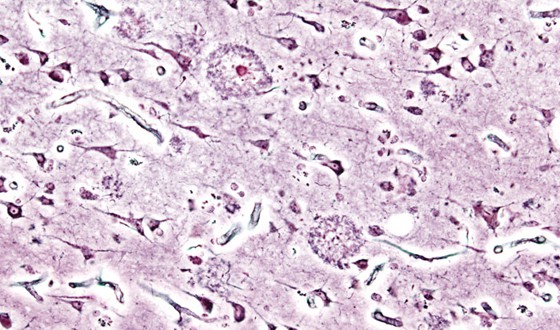
Histopathogic image of senile plaques in the cerebral cortex in a patient with pre-senile onset Alzheimer’s disease
Two drugs from Eli Lilly and one from Roche’s Genentech unit are to be tested in a large-scale Alzheimer’s prevention study due to start next year, according to researchers at Washington University in St Louis, US.
Lilly’s solanezumab and Genentech’s gantenerumab are the main drugs to be tested in the study, while a Lilly beta secretase (BACE) inhibitor currently in phase II testing may also be included, say the researchers.
All three are designed to interrupt the process by which neurotoxic amyloid plaques are laid down in the brains of people with Alzheimer’s, but work in a slightly different way. They were selected from a portfolio of more than a dozen drug candidates.
Solanezumab works by binding to soluble amyloid beta, allowing it to be cleared from the body before plaques are formed, and has shown a glimpse of efficacy in phase III trials despite missing primary clinical endpoints.
Gantenerumab binds to aggregated amyloid beta and is in a phase III trial – called SCarlet RoAD – that begain in 2010 and is testing the drug’s ability to halt Alzheimer’s prior to the onset of dementia. Finally, the unidentified Lilly BACE inhibitor works upstream in the plaque creation process, reducing the amount of amyloid beta produced.
This is the second Alzheimer’s prevention study to be announced in recent months. Earlier this year, Genentech’s parent Roche said it would start a trial of another anti-amyloid antibody called crenezumab in an extended family in Colombia that are genetically predisposed to develop the disease in their 40s.
The Washington University at St Louis study will test the three drugs in around 160 people with inherited mutations that cause early-onset Alzheimer’s, making use of biomarkers as well as clinical endpoint such as cognitive and functional measures.
There has been a string of negative trials involving amyloid-targeting drugs in Alzheimer’s, including those involving solanezumab, Pfizer’s antibody bapineuzumab and gamma secretase inhibitors from Lilly (semagacestat) and Bristol-Myers Squibb (BMS-708163), amongst others.
One criticism of these studies has been that because they involved patients who already had dementia symptoms, the interventions were being given too late in the disease process to have an effect.
There has been speculation that the deposition of amyloid is a very early event in Alzheimer’s, occurring perhaps as much as 15 years before symptoms develop, so early intervention may be imperative to prevent the cascade of events that lead to neurodegeneration.
“All of the experimental group’s subjects will be within 10 to 15 years of the anticipated age when symptoms of cognitive decline and dementia are expected to appear,” said the researchers behind the new study, which will be led by investigators at the Dominantly Inherited Alzheimer’s Network Trials Unit (DIAN TU) located at Washington University.
The trial will initially run for two years, but it will be extended and expanded if one or more of the drugs are effective in slowing or stopping indicators of pre-symptomatic Alzheimer’s disease, such as evidence of brain plaques and/or changes in the blood and cerebrospinal fluid.




